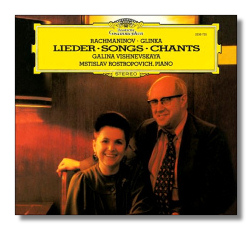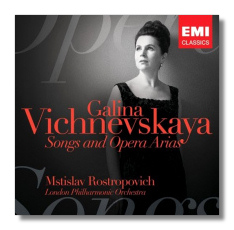
The Internet's Premier Classical Music Source
Related Links
- Latest Reviews
- More Reviews
-
By Composer
-
Collections
DVD & Blu-ray
Books
Concert Reviews
Articles/Interviews
Software
Audio
Search Amazon
Recommended Links
Site News
 CD Review
CD Review
Galina Vishnevskaya

Lieder · Songs · Chants
- Sergei Rachmaninoff: Songs (5)
- Mikhail Glinka: Songs (8)
Galina Vishnevskaya, soprano
Mstislav Rostropovich, piano
Deutsche Grammophon 4776195 ADD 44:20


Songs & Opera Arias
- Modest Mussorgsky:
- Sunless
- Songs and Dances of Death (orch. Shostakovich)
- Songs (6)
- Nikolai Rimsky-Korsakoff:
- Sadko: Lullaby of the Sea Princess
- The Tsar's Bride: Marfa's Scene and Aria (Act Two); Lyubasha's Aria (Act Two)
- In the silence of the night, Op. 40 #3
- Eastern Song: Enslaved by the rose, the nightingale Op. 2 #2
- The dying glow of the sunset, Op. 39, #2
- The heavy clouds disperse
- The clouds begin to scatter (Elegy) Op. 42 #3
- Plus sonore que le chant de l'alouette, Op. 43, #1
- Not the wind blowing from the heights, Op. 43, #2
- The octave, Op. 45, #3
- The Nymph Op. 56 #1
- Piotr Ilyitch Tchaikovsky:
- The Snow Maiden, Op. 12 Lel's Song
- Song: 'Was I not a blade of grass?' Op. 47 #7
- Do not believe, my friend Op. 6 #1
- The Fearful Minute Op. 28 #6
- Sleep, my poor friend, Op. 47, #4
- In this moonlight, Op. 73, #3
- Cradle Song Op. 16 #1
- In the midst of the ball, Op. 38 #3
- If only I had known, Op. 47, #1
- It happened in the early Spring Op. 38 #2
- Snova, kak prezhde, odin, Op. 73 #6
- Serge Prokofieff: Russian Folksongs, Op. 104
- Dmitri Shostakovich:
- Seven Romances on Verses by Alexander Blok, Op. 127
- Five Satires 'Sketches of the past', Op. 109
Galina Vishnevskaya, soprano
Mstislav Rostropovich, piano & cello
Ulf Hoelscher, violin
Vasso Devetzi, piano
London Philharmonic Orchestra/Mstislav Rostropovich
EMI Classics 365008-2 ADD 3 CDs: 76:33, 65:44, 58:44
In the late 1970s and early 1980s, it is possible that Galina Vishnevskaya was (unintentionally) more famous in the West for her politics than for her fabulous soprano voice and musicianship. She and her husband Mstislav Rostropovich had been dissidents in their Russian homeland. Their outspokenness, and their association with Dmitri Shostakovich and Alexander Solzhenitsyn, among others, greatly annoyed Party leaders, who attempted to limit their travels abroad and their performances within the Soviet Union. In 1974, the couple left and settled in America; four years later, the Soviet Union declared that they were "ideological renegades" and banished them from the country. Mikhail Gorbachev restored their citizenship in 1990, but by then, Vishnevskaya's career was effectively over, although both have returned to Russia and have done much to support the cultural scene in their homeland.
The Soviet Union's loss was the West's gain, of course. Both of these releases, recorded between 1974 and 1978, present Vishnevskaya and Rostropovich together in material they knew inside out; certainly no Western performers could have brought more authenticity to this repertoire. One can accuse EMI and Deutsche Grammophon, however, of lacking imagination. Back in Russia, Vishnevskaya's repertoire encompassed roles such as Aïda and Madame Butterfly, yet her recordings for these labels consist almost solely of Russian songs (or "romances") and arias from Russian operas. As a result, we have only an incomplete portrait of this singer, who certainly could have competed with Western stars who also were in and out of the recording studios in the 1970s. (Deutsche Grammophon recorded Vishnevskaya's Tosca in the 1970s, with Rostropovich conducting, but this was an exception.) DG's program is completely new to CD; parts of EMI's have been on CD before.
Another complaint needs to be made about both of these reissues: they lack texts and translations. Outside of Russia, this repertoire is not overly familiar, and I suspect many listeners draw a blank after Tchaikovsky's None but the Lonely Heart, Mussorgsky's Song of the Flea, and Rachmaninoff's Vocalise. If one doesn't understand the texts, then what is the point of hearing the song? Vishnevskaya's performances are turned into a series of lovely sounds, and whatever meaning one can glean from and the titles and her inflections. That's not the way to treat this repertoire, and not the way to respect Vishnevskaya's hard work, either. The absence of texts – or even a referral to a website where texts and translations can be found – is a serious blot on both of these releases.
Fortunately, there's a lot of pleasure to be had here, even if you don't always know exactly what is going on. Vishnevskaya was born in 1926, so at the time that these recordings were made, her voice was relatively intact, and yet she was a fully mature interpreter. This is a voice with metal in it, yet because the metal is gleaming-hot, it is malleable, and she wraps it tightly around the sinuous melodies. Powerful as the singing is, Vishnevskaya can pull her voice back and spin out eerily beautiful pianissimos as thin yet as strong as fishing line. The tone is often haunting and melancholy. Still, Vishnevskaya can shake off the fogs and become wild, menacing, charming, or downright funny, as the song demands. Although a program of song after song can be tough going, Vishnevskaya finds the variety in them, and even if you don't understand a word of Russian, I suspect that you will gather a lot of the meaning in the songs from the soprano's vivid performances. Rostropovich is more famous for playing the cello and conducting, yet his work at the piano fits hand in glove with his wife's singing. Although he is not the center of attention here, it should be noted that the EMI set contains examples of his work as a cellist, as a conductor, and as a pianist. A triple threat performer! Some people got into line more than once when God was giving out talent. In Shostakovich's Seven Romances on Verses by Alexander Blok, pianist Devetzi and violinist Hoelscher are expert partners.
Where to begin? I'd start with the EMI set, which contains more than three of hours of music at a reasonable price. Once you've acquired it, I suggest that you skip right to Disc Two and try Rimsky-Korsakov's The heavy clouds disperse, and Tchaikovsky's Cradle Song – two unforgettably beautiful songs. Vishnevskaya's voice seems a little less secure in DG's program – or is it just the way that she was recorded? – but it also contains many gems, including Rachmaninoff's ever-popular Vocalise – sung, for once, as it was written – and the poignant Oh never sing to me again. Fortunately, Vishnevskaya can sing to us as many times as we want, as long as these worthwhile reissues are there for the hearing.
Copyright © 2007, Raymond Tuttle




















